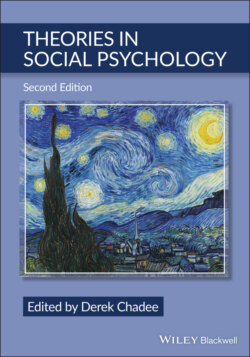Читать книгу Theories in Social Psychology - Группа авторов - Страница 21
Juvenile Defiance
ОглавлениеReactance theory has assisted in the understanding of adolescents’ defiance, and problematic behavior as goal frustration toward a perceived free behavior can lead to reactance. Van Petegem et al. (2015) studied adolescents’ parental defiance. They found that parental controlling styles created autonomy need frustration eliciting adolescent’s reactance which in turn influenced adolescents’ behavioral problems, including internalizing and externalizing problems and non-acquiescence to parental requests. Kakihara and Tilton-Weaver (2009, p.1734) emphasize this point, noting: “If adolescents feel unduly constrained by their parents’ control, or interpret their parents’ control behaviors as a restriction of free will, consistent with reactance theory, they would likely seek avenues for reasserting their autonomy. This might include continuing prohibited behavior or friendships or seeking leisure contexts in which adults are not present, which are more likely to lead to increases in problem behaviors.” Further, parental styles may either enhance or neutralize reactance (Valkenburg et al., 2013). In another study, researchers (Lowenthal et al., 2021 ) found that older than younger adolescents were more defiant in responding to reminders to continue with their HIV medication. The authors suggest that adherence to medical treatment in this group could be higher if the relationship between autonomy and reactance is considered. Other studies have argued a relationship between parental psychological control and reactance (see Geng et al., 2020; Sharf & Goldner, 2018). Geng et al. findings suggest that reactance inclusive of negative cognition and affect emerging as a result of threat to autonomy may lead to externalizing behavior of cyberbullying. Additionally, adolescents’ need for independence has been associated with the use of tobacco. However, research has shown that higher levels of psychological reactance in this group are twice more likely to lead to a higher risk for smoking initiation (Miller et al., 2006). Message framing is essential, as one study found that gain-framed messages rather than loss-framed messages were less likely to create reactance as the latter was more likely to be perceived as a threat to freedom (Cho & Sands, 2011). Parental-juvenile interaction would benefit from the framing of discourses intend to reduce threats.
Reactance and defiance may not only be situationally driven. For example, for three of the four factor structures identified in the Therapeutic Reactance Scale (TRS, a dispositional measure of reactance), Inman et al. (2019) found that there was a correlation between these factor structures and novelty seeking. Specifically, they found significant correlations between novelty seeking, (associated with impulsivity, disorderliness, excitability, and anger proneness), and conflict seeking resentment of authority and preservation of freedom. They recommend TRS as a useful measure for evaluation and to assist in interventions for counselors and psychologists to efficiently diagnose adolescents’ noncompliance in different settings.
